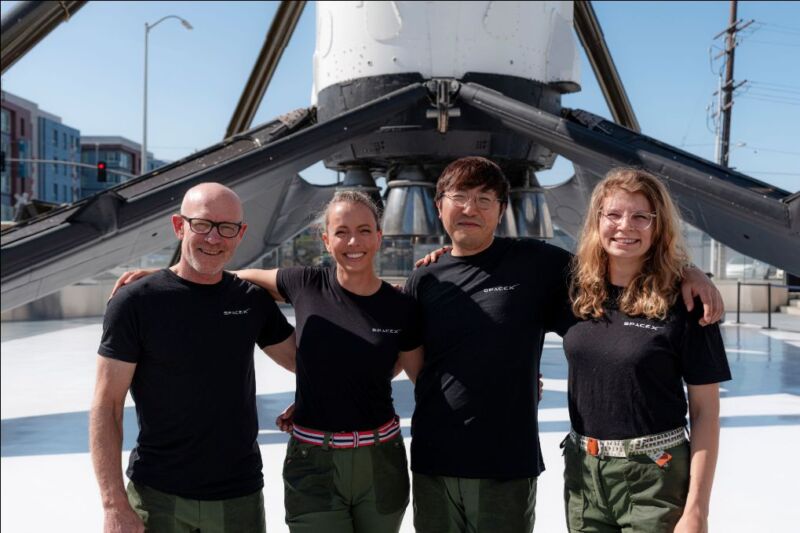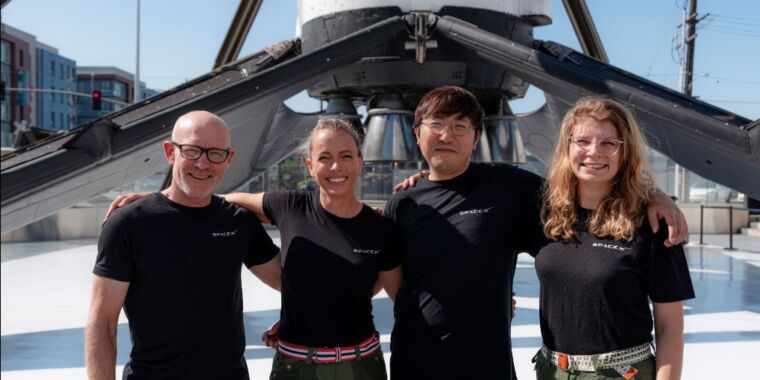
SpaceX
SpaceX will conduct the first-ever human spaceflight over Earth’s poles, possibly before the end of the year, the company announced Monday. The private Crew Dragon mission will be led by a Chinese-born cryptocurrency entrepreneur named Chun Wang, and he will be accompanied by a polar explorer, a roboticist and a filmmaker he has befriended in recent years.
The “Fram2” mission, named after the Norwegian research vessel Fram, will fly from SpaceX's launch facilities in Florida into a polar corridor and fly directly over the north and south poles. The three- to five-day mission is planned to fly over Antarctica around the Southern Hemisphere's summer solstice, to provide maximum illumination.
The four-person crew will, fittingly, fly aboard Crew Dragon Endurancewhich is named after Ernest Shackleton's famous ship that got stuck in the Antarctic ice and eventually sank there, about a century ago. The spacecraft will be equipped with a dome for both photography and filming.
This will be SpaceX’s third free-flying mission aboard Crew Dragon, following the Inspiration4 mission funded and spearheaded by American entrepreneur Jared Isaacman in 2021, and its upcoming Polaris Dawn mission, potentially launching later this month. In an interview, Wang said he modeled the Fram2 mission’s crew and public outreach programs on the template Isaacman laid out.
A background in bitcoin mining
Wang, who was born in China, got into bitcoin mining at the very beginning. “I first heard about bitcoin in 2011 and I got into it almost immediately,” he said. “I did that for two years and then I started a mining pool.”
He founded China’s first bitcoin mining pool, F2Pool, in 2013. This type of company allows miners with powerful computers to collectively “mine” bitcoin and share in the profits. Wang later led the company’s decentralization. He moved to Thailand in 2015 and later to South Korea. He now holds Maltese citizenship and has more or less traveled the world since 2021. Wang said he likes to spend a lot of time on Svalbard, a Norwegian archipelago.
In an interview, Wang said he became a billionaire in 2021 after the price of bitcoin, dogecoin and other cryptocurrencies skyrocketed. He had long been interested in space, Wang added, so he began talking to SpaceX about buying a seat on a private Dragon mission. In 2023, the conversations matured and Wang realized that if he bought an entire mission, he could control its parameters.
He wanted to try something new, and flying a polar mission matched his interests in cold places on Earth. The highest inclination flight ever by a manned spacecraft was the Soviet Vostok 6 mission in 1963, when Valentina Tereshkova's spacecraft reached 65.1 degrees. Now Fram2 will fly repeatedly and directly over the poles.
Meet the crew
Chun said he met two of the crew members a few years ago on a ski trip, and another in Svalbard. They all share his interest in exploration, adventure and the poles. He said he hopes they will all contribute to the mission to increase humanity’s understanding of Earth’s poles and spread the inspiration of space travel.
The other three crew members of the mission are:
Jannicke Mikkelsen, vehicle commander: Mikkelsen is a film director and cinematographer specializing in remote and hazardous environments such as the Arctic, the ocean, aviation, and space. In 2019, she was Payload Specialist on the record-breaking One More Orbit polar flight in honor of the 50th anniversary of Apollo 11.
Eric Philips, vehicle pilot: Philips is a professional polar adventurer and guide, having completed dozens of ski trips to the North and South Poles since his first polar expedition in 1992. He is a co-founder of the International Polar Guides Association and co-creator of the Polar Expeditions Classification Scheme.
Rabea Rogge, mission specialist: Rogge, a robotics researcher from Berlin, is currently doing her PhD in Norway. Her work ranges from leading a satellite mission to investigating ocean robotics in the Arctic, reflecting her dedication to advancing technology in both the polar regions and space.
“I'm amazed that you can now become a commercial astronaut,” Mikkelsen said in an interview. “I have a pretty bad injury history, I was in a wheelchair for a good year, and when I was between three and five years old, I learned to walk again. I wish I could tell that girl she can be an astronaut.”

